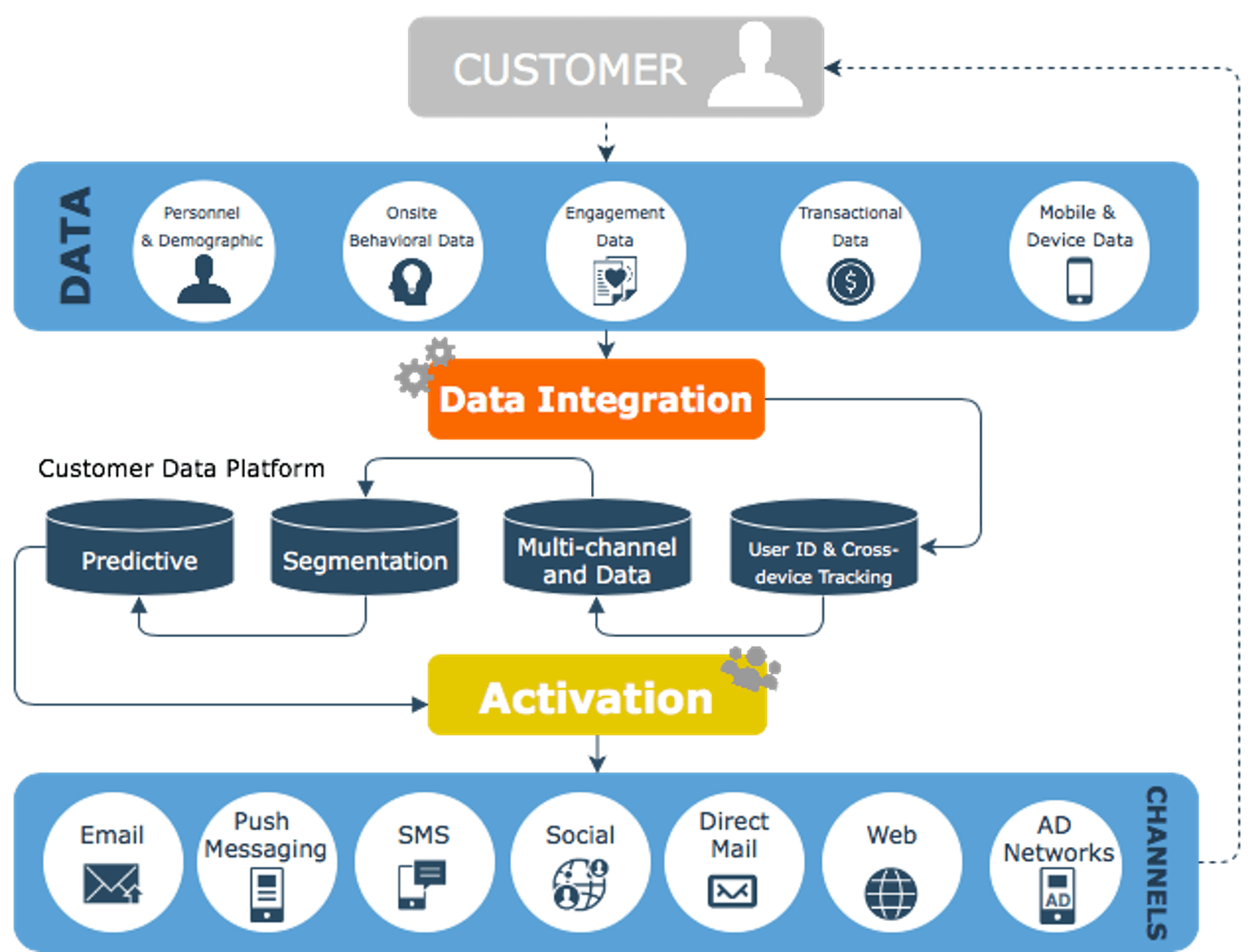What is a CDP?
As businesses are collecting more and more data in various forms and from diverse sources, the need for a centralized database with a friendly user interface for marketers to easily use is stronger than ever.
So what is a CDP?
CDP stands for Customer Data Platform. It stores all customer-related data in one platform: from their website visits and clicks to email engagement activities and commerce transactions. Instead of being stored separately in multiple platforms (CMS, CRM, Marketing Automation Platform, Social Media, etc.), all data can be stitched to the unique customer profile, allowing advanced segmentation and personalization.
The key features of a CDP include:
- Data Collection: to collect data from multiple customer data sources in real time
- Data Unification: to consolidate and stitch collected data to the unified customer profile of a single person
- Segmentation: to allow users (marketers, decision-makers, etc.) to segment customers/leads into custom audiences for personalization or marketing automation campaigns
- Activation: to push audience segments and customer data to other platforms like email, instant messaging, mobile, social media, and web to activate marketing campaigns

When does a business need to adopt a CDP?
Would you need a CDP if you already have a CRM? A CDP is definitely not the same as a CRM system. While a CDP is a newer concept, most businesses probably already have a CRM (Customer Relationship Management) system in place. CRMs usually store customer demographic and transaction data. They do not store anonymous user behavior (contacts without known email addresses or phone numbers or names). CRMs aren’t built to ingest large volumes of data from different sources either.
On the other hand, a Customer Data Platform captures data from multiple sources such as social media channels, search engines, email activities, website engagement, mobile app interaction, points of sale, and e-commerce transactions. A CDP can collect information from both known customers or prospects and anonymous visitors. This helps with analyzing customer behaviors and customer journeys to improve current marketing performance and increase conversion rate by serving personalized content.
Overall, if personalization, data-driven marketing and customer satisfaction are among your priorities, you should consider adopting a CDP for your business.
Business applications of a CDP and example use cases
A CDP helps with better segmentation, which can then be used to trigger relevant and effective marketing automation campaigns. Digital marketing campaigns nowadays don’t just leverage any single channel, but combine multiple channels, forming a multi-stage customer journey. A prospect may find out about your website while searching for a keyword on Google, interact with your website, then see ads or read what your customers say about your brand on Facebook, Instagram, Twitter or LinkedIn. Later on, the prospect decides to fill out a form on your website and becomes part of email marketing campaigns or receives promotional instant messages via text or messaging services like WhatsApp, Viber or Telegram. For such complex customer digital journeys, a CDP allows you to collect cross-channel campaign statistics.
Here are a few example marketing automation use cases that a centralized Customer Data Platform would enable your brand to implement:
Use Case #1: Providing personalized content or product recommendations
Based on the user’s search behaviors on search engines, browsing history on your company’s website or past purchases, you can push relevant content, articles or products that the user is most likely to interact with or purchase. The activation channels can be email campaigns, text/push notifications, popups or ads.
Use Case #2: Upselling or cross-selling
Similar to use case #1, you can upsell or cross-sell products based on your customers’ recent purchases or search intent.
Use Case #3: Increasing Customer Satisfaction
You can trigger email, web or mobile campaigns that ask for a review of a product your customer recently purchased, perhaps 60 days after their purchase date. If a customer gives you a low rating, an automated notification can be sent to your customer service representative to follow up and find out why or solve problems before the customer has to email or call in to ask for help. Having a CDP would allow you to automate all such tasks so your brand can become responsive and show that you deeply care about your customers.
Use Case #4: Delivering targeted ad campaigns to reduce costs and increase ROI
You can now exclude users that recently purchased on your website or those who are not likely to engage with your ad campaigns, meaning you don’t have to pay for irrelevant hits. This means significant savings in your Google or Facebook ad budget, while also ensuring that you’ll reach the right audience with your targeted ad message.
How to choose the right CDP for your business
There are lots of players in the CDP market, so there are many options for you to evaluate and choose from. For example, Lytics stands out for its ability to provide content recommendations, based on its smart algorithm to calculate content affinity scores and behavioral scores. Episerver Analytics (formerly Insight) enables a highly personalized website experience that doesn’t require much developer work, making it easy for marketers. Episerver recently acquired Idio, a 1:1 content personalization and analytics platform that will enhance its CDP (Episerver Analytics) significantly. Some of the other big names like Adobe, SAP, Marketo, and Salesforce have their own CDPs as well.
How to choose the right CDP for your business really depends on the size of your business, whether you’re B2B or B2C, whether you’re involved in e-commerce, the marketing channels that you want to use, and your business priorities and goals. Marketing automation is not all about the tool, but more about how you use it to fit your business. The platform for big brands that everyone praises may be overkill for your business size, while not being as effective as some of the more affordable CDPs.
We have worked with various clients and recommended different tools for each business based on its unique needs. Additionally, we were able to double website conversions for a well-known client, while increasing web reviews by 28% and increasing the number of pageviews by 40%. Do you need consultation on which CDP to use for your marketing personalization and marketing automation projects? Contact us today!
to transform your business and drive results?



